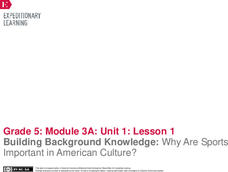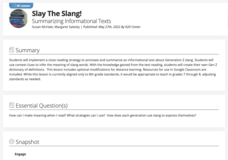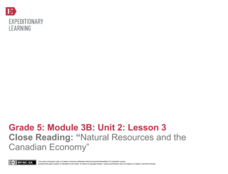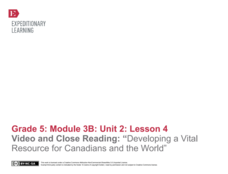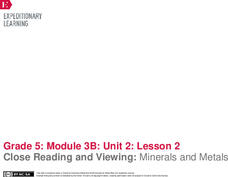Institute for the Professional Development of Adult Educators
Using Context Clues with Signal Words
When you come across an unfamiliar word in a text, do you skip it and move on? Practice using context clues to identify words you don't know with a thorough set of language arts lessons. The resource reinforces close reading and critical...
Montgomery K12
Clues in Sentences Investigation
Explore the variety of context clues that help us learn new meanings of unknown words! With this presentation, pupils go in depth into each type of context clue and have their knowledge tested with several small reading passages in which...
Curated OER
Mini-Lesson Planning for Inferences
Making inferences and drawing conclusions is a key component to successful active reading. Encourage your class to use context clues and prior knowledge to infer different elements of a story, including the setting, plot, and character...
Have Fun Teaching
Making Inferences (1)
Provide readers with an opportunity to practice drawing inferences by giving them this activity. Kids identify the text and author, record a sentence they believe infers rather than directly says, and then write the deeper meaning the...
Ed Worksheets
Read the Story
Want to boost your readers' comprehension skills and strategies? Look to these five pages, each with a short story and questions to answer covering main idea, facts, sequence of events, context clues, conclusions, and making inferences.
Massasoit Community College
Vocabulary: Getting Meaning From Context
Introduce your class to four different types of context clues: definition, example, comparison or contrast, and inference. Each type has its own description, example, and practice set. After pupils have mastered the four types, put it...
Have Fun Teaching
You Make the Call (10)
What will happen next? Young writers plot what will happen next after studying the clues in four story starters.
EngageNY
Building Background Knowledge: Why Are Sports Important in American Culture?
What makes sports so special to many Americans? Scholars ponder the question as they participate in a gallery walk, immersing themselves in images and texts about sports. Pupils also complete a vocabulary strategies anchor chart to...
K20 LEARN
Slay the Slang! Summarizing Informational Texts
Middle schoolers get hip to the jive with a lesson plan about slang. They closely examine examples of slang and use context clues to infer the meaning of the terms. Groups read and summarize an article about a teacher who created a Gen Z...
Hampton-Brown
From "First Crossing"
Young scholars look closely at four tales taken from the collection of short stories, First Crossing edited by Donald R. Galloby. While examining the life of four teenagers and the lives they lead as U.S. immigrants, your enthusiastic...
K20 LEARN
More than Meets the Eye: Direct and Indirect Characterization
Willy Wonka takes center stage in a lesson about direct and indirect characterization. Scholars read a passage from the story about Wonka's Grand Entrance and watch a film clip of the same, noting examples of direct and indirect...
EngageNY
Mid-Unit Assessment: Text-Dependent and Short Answer Questions: Excerpts from “A Limited Supply”
There's no such thing as an unlimited resource. Scholars complete a mid-unit assessment by reading A Limited
Supply. They answer text-dependent questions and complete a graphic organizer about key terms in the text.
EngageNY
Close Reading: “Natural Resources and the Canadian Economy”
Readers continue to learn how natural resources are important to Canada's economy. They read, annotate, and answer text-dependent questions about Natural Resources and the Canadian Economy. They then discuss key terms in the text.
EngageNY
Video and Close Reading: “Developing a Vital Resource for Canadians and the World”
Scholars watch Developing a Vital Resource for Canadians and the World to learn about the supplement potash that helps plants grow. They watch the video several times, completing a note catcher to record key ideas along the way. Pupils...
EngageNY
Close Reading and Viewing: Minerals and Metals
How easy is it to live off the land? Scholars read Minerals and Metals in Your Life and discuss how Canada's natural resources meet the needs of the people. Pupils watch a brief video and discuss the gist of the text and video. They then...
Curated OER
Unwind: Directed Reading Thinking Activity
To generate interest in reading Neal Shusterman's young adult science fiction novel Unwind, class members engage in a Directed Reading-Thinking Activity (DRTA) that asks them to examine the front and back covers, the blurbs, and "The...
University of California
Impact of the California Missions on Native Americans
While the Spanish claimed to bring civilization to California indigenous peoples, in reality, they also brought violence and forced assimilation to European values. Primary sources, such as the reports of Catholic priests and Europeans...









